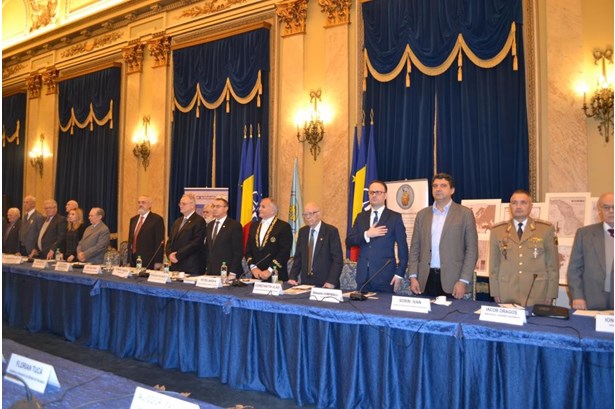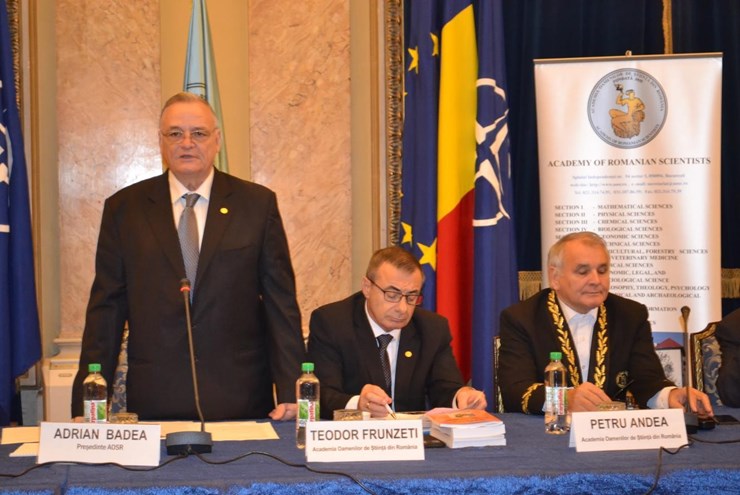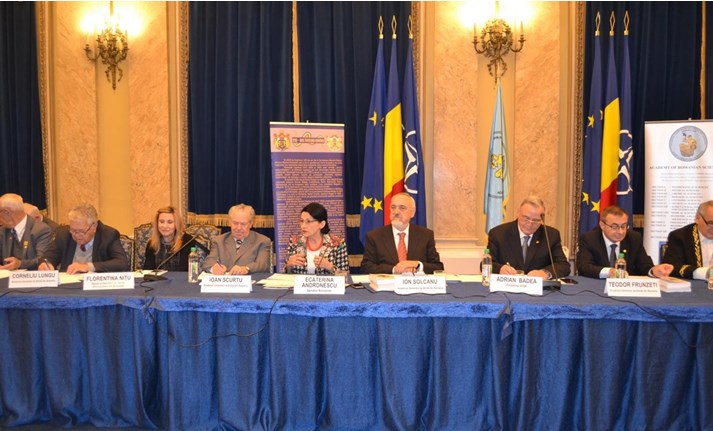On 8 November 2018, starting at 10.00 am, in the Marble Hall of the National Military Circle, the National Debate “ARMY, CHURCH, SCHOOL – INSTITUTIONS WITH FUNDAMENTAL ROLE IN THE COMPLETION OF THE GREAT UNION” took place. The event was organized by the Academy of Romanian Scientists as part of the institution’s celebration of a century since the end of the First World War and the Centenary of the Great Union. The debate was attended by representatives of state institutions, members of the clergy and academia, scientists and scholars, scientific researchers, university and pre-university teachers.

The debate aimed to highlight the specific way in which the Army, the Church and the School were involved in Romania’s participation in the First World War and in the process of the country’s unification by uniting the Romanian provinces with the Mother Country and the role played, often at the cost of supreme sacrifice, by teachers, professors, priests, soldiers and officers in the achievement of the ideal of freedom, national unity, the Great Union and the Great Romania.
The topics of the debate were the following: the role of the school in the emancipation of the Romanian people and in the awakening of the national consciousness at the end of the 19th century and the beginning of the 20th century; the country’s teachers, in the front line and at the forefront of the process of achieving the Great Union; the Church, pillar and cohesive factor of Romanian existence throughout history; priests and prelates, on the front line of the First War and in the national mobilization of the Kingdom and the Romanian provinces; the Romanian Army – from the War of Independence to the Great War: In the service of the country, freedom, identity and Romanian unity; Threads of sacrifice and glory: Mărăști, Mărășești, Oituz – “This is not the way!”; The contribution of the Army to the process of the country’s Reunification through the three fundamental acts: The Union of Bessarabia with Romania (27 March 1918), The Union of Bukovina with Romania (28 November 1918), The Union of Transylvania with Romania (1 December 1918); The role of the Army in defending the Great Union after 1 December 1918. Within this broad historical and thematic framework, the discussions also made a curtain call to the present through the theme: School, Church and Army, a century after the Great Union. Their role in the present and future of Romanians and Romania.

In the opening, the host of the Debate, Prof. Dr. Eng. Adrian BADEA, President of the Academy of Romanian Scientists, underlined that the event is part of the series of events dedicated to the Centenary in Romania and abroad. The Army, the Church and the School, he said, are three institutions that played a major role in the achievement of the Great Union. The union of all Romanians is an ideal that runs through our history, a process stretching over the centuries, lit by Michael the Brave like a flame, which has never since been extinguished in the consciousness of the people. This is why the Great Union is the corollary, the apotheosis of a long process. President Badea highlighted the blood sacrifice of Romanians in the First World War, as recorded by official statistics: more than 300,000 soldiers fallen in the line of duty, more than 75,000 officers dead, more than 80,000 seriously wounded, plus more than 700,000 people who died among the population due to the crimes of foreign armies, famine, disease and cold. The Church, the School and the Army have ignited in the minds of Romanians the love for the country and for the ideal of national unity, the AOSR president added.
Professor Ioan Scurtu (full member of the AOSR) gave a history of the official reception of the Great Union a century ago and later, during the Stalinist period, up to the present day. Over the years, depending on regimes and ideologies, there have also been voices questioning the legitimacy of the great historical event. The historian underlined that the ideal of unification lit up like a flame the conscience of the Romanian people, highlighted the important role of our scholars in awakening the national conscience among the masses and the fundamental contribution of the politicians who knew how to exploit this conscience and the historical conjuncture. Professor Scurtu quoted Blaga, a participant in the great event in Alba-Iulia, who was impressed by the extraordinary popular enthusiasm, and Iorga, who spoke of the Romanian people as a “martyred and heroic people”.
A comprehensive history of Romanian education, from its origins to the present day, has been given by Prof. Dr. Eng. Ecaterina Andronescu (President of the Chemical Sciences Section of the Academy of Romanian Scientists), Minister of Education on several occasions, stressing that the school has accompanied our development as a people, contributing fundamentally to the development of Romanian civilization. It is a history that starts with the School of Cenad, in Banat, and reaches the Romanian universities of today, 12 of which have entered the Shanghai top, which is a remarkable achievement for our education. In his presentation, he highlighted the contribution of exemplary figures such as Gheorghe Lazăr, Spiru Haret, Constantin Angelescu to the foundation and development of Romanian education. “A country cannot develop without bookish people. The Romanian school has made an important contribution to the development of the country”, Mrs Andronescu concluded. In this context, he deplored the fact that many young people are going abroad without the intention of returning, which is a serious problem for the future of the country.
Gen. (r) Prof. Teodor Frunzeti (President of the Military Sciences Section of the Academy of Romanian Scientists) said that 1918 was the corollary of the modernization of the Romanian state. The earliest evidence of the Union is linked to Michael the Brave, as the ideal of unity became more acute after 1848. The first success of the national idea is January 24, 1859, followed by the achievement of Independence, consecrated with the blood of heroes, over 10,000 dead and wounded. Romania’s entry into the war, General Frunzeti continued, expressed a strategic national interest in fulfilling the ideal of the Union. In this process and in our history, the Army, the School, the Church have been and are fundamental institutions. The three institutions, in a cumulative and synergic action, kept the national ideal alive, and generated unity of will and action in the achievement of the objective of the Union. To those who made the national ideal possible, a tribute of gratitude is due, in the Centenary year and always. We, today, must act to modernise Romania within the Euro-Atlantic community, to which it rightfully belongs, Professor Frunzeti added.
The role of the Army in the achievement of the Great Union was of overwhelming importance, said Prof. dr. Ioan Solcanu (President of the Historical and Archaeological Sciences Section of the Academy of Romanian Scientists), who presented the history of events in Russia during the war and how they influenced developments in Romania. With relevant data and arguments, analysed in the logic and causality of historical moments, the professor from Iasi stressed that the Army did its duty to the country. General Anghel Andreescu (full member of the Military Sciences Section of the AOSR) developed a topic of special interest, the contribution of the Romanian secret services to the achievement of the Great Union. The presentation, with facts and figures, shows that the Romanian secret services played an important role in the events and in the achievement of the Union. He stressed that Romania must have an army, because the country cannot defend itself only with its “iron chest”.
Prof. dr. eng. Petru Andea, Secretary of State in the Ministry of National Education (full member of the AOSR), said that “the people made the Union” and referred to the “anonymous heroes” who contributed to the achievement of the national ideal. The Church played an “extraordinary role” in the first war and in the achievement of the Union, its priests and all its ministers showing a spirit of sacrifice and patriotism. In fact, the Church played a fundamental role in the great events of our history in Transylvania, said Professor Andea, exemplifying the Horea’s Rebellion, Supplex Libellus, Avram Iancu, the Trial of the Memorandists, the First World War. The speaker concluded by quoting Acad. Ioan-Aurel Pop, President of the Romanian Academy, according to whom the Act of Alba-Iulia constitutes the second foundation of the Romanian people after the one made by the Apostle Andrew at the mouth of the Danube, superimposing Christianity on the Greek and Latin civilizations.
Alexandru Cumpănașu, president of the National Coalition for the Modernization of Romania, highlighted the important role of the Orthodox Church in the process of unification of the country through education and human sacrifice, through the priests who supported the soul of the soldiers, who were with them, the Romanian Army, the peasantry who fought and sacrificed. The peasants played a major role in the Romanian Army, and Romania and the Romanian provinces had the chance of visionary politicians. Criticizing the current situation, the political struggle, the situation of Romanian resources and wealth, Alexandru Cumpănașu stressed that we must learn from the lessons of the past.
Historian Petre Țurlea (full member of the AOSR) spoke about the major role of the school in the achievement of the Great Union. As throughout Romanian history, the school continues to play an important role in the process of Romania’s modernization. The historian stressed the need for today’s generations to work together so that Romania can continue to exist and become a prosperous country. To this end, we need to strengthen the school and “re-establish it as a national school”.
The series of interventions continued with lectures on topics related to the general theme of the Debate. Among them were Prof. Dr. Jipa Rotaru – “The Romanian Army in support of the Great Union”, Gen. Prof. Dr. Gheorghe Boaru – “The role of the Army in the defence of the Great Union after 1 December 1918”, Conf. Dr. Adrian Ignat (Archdiocese of Targoviste) – “The role of the Romanian Orthodox Church in preserving the unity of the Romanian people during the First World War”, Lect. Dr. Dumitru Carabaș (Archbishopric of Constanta) – “Church life in Dobrogea between 1878-1918. Churches built in Constanta County”, Prof. dr. Radu Vergatti – “The role of schools, teachers and professors in the process of achieving Greater Romania”, Gen. prof. dr. Cristea Dumitru – “The Romanian Army Transmissions during the War for the Reunification of the Nation (1916-1919)”, Gen. prof. dr. Mircea Udrescu – “Duplicitous actions on Romania and its army during 1914-1920”, Gen (r) Grigore Stamate – “Army and Church – same faith, same ideal”, Prof. dr. Victor Ciorbea – “The role of the military clergy in the years of the First World War, reflected in MISIUNEA Magazine”, Col. dr. eng. Anatol Munteanu – “Military priest ALEXEI MATEEVICI, personality and promoter of the Union”, Prof. dr. Mihai Drecin – “Romanian banks in Transylvania and the national school 26. Case study: ALBINA Bank of Sibiu and the students’ mass 1895-1918”, Prof. Dr. Octavian Buda – “Doctors and the Great Union”.
The conclusions of the Debate will be drafted in a final Synthesis, which will be submitted to the political authorities, disseminated in academic and educational circles and presented to public opinion. The papers presented at the event will be gathered in the volume “School, Church, Army – institutions with a fundamental role in the achievement of the Great Union”, published by the Academy of Romanian Scientists under the auspices of the Centenary.
At the end of the debate, Prof. Dr. Eng. Adrian BADEA, President of the Academy of Romanian Scientists, said: “In a very special space, with a symbolic value, the Marble Hall of the National Military Circle, where the footsteps of history resound, we have brought to the dialogue table scientific, political, military and cultural personalities of today’s Romanian elite, gathered under a theme of cardinal importance, the values of our history and love of country. In this privileged setting, important truths for history, present and future were told. One constant idea, which has run through the opinions expressed, and which I have also expressed on many occasions, is that we must learn from the lessons of history. And the good and the bad. Through such events, which we will continue to organize at the highest academic standards, I believe that we can bring together today’s Romanian elites in a necessary debate on the present and, especially, the future of Romania. The Great Union must be for us, at the Centenary and beyond, a masterly lesson of history.”
***
The National Debate “Army, Church, School – institutions with a fundamental role in the achievement of the Great Union” is part of the “CENTENARY” Programme of the Academy of Romanian Scientists, organised in the framework of the one century anniversary of the end of the First World War and of the union of Romanians and Romanian provinces into one country, Greater Romania. Complex in structure, broad in scope and diversity, dense in academic activities and events, the Programme
“CENTENARY” includes scientific events, international conferences, symposia, sessions, workshops, cultural and educational projects, publishing of books, proceedings volumes, digital works, projected nationally and internationally throughout 2018. Details on the AOSR website: https://www.aosr.ro/progrm-centenar-aosr/
Communication and Public Relations Office of the Academy of Romanian Scientists
(Contact: comunicare.aosr@gmail.com )

